As Ukraine grain deal emerges, U.S. aims to ease concerns over Russia sanctions
2022.07.15 00:03

Farmers harvest wheat, amid Russia’s attack on Ukraine, in the Donbas region, Ukraine July 13, 2022. REUTERS/Gleb Garanich
By Daphne Psaledakis and Michelle Nichols
WASHINGTON (Reuters) – The United States on Thursday sought to facilitate Russian food and fertilizer exports by reassuring banks, shipping and insurance companies that such transactions would not breach Washington’s sanctions on Moscow over its invasion of Ukraine.
Enabling those Russian exports is a key part of attempts by the United Nations and Turkish officials to broker a package deal with Moscow that would also allow for shipments of Ukraine grain from the Black Sea port of Odesa, which have been blockaded by the war.
The written U.S. clarification came a day after Russia, Ukraine, Turkey and U.N. officials met in Istanbul for talks aimed at resuming Ukraine’s grain exports. Turkey announced that the parties would return next week to sign a deal.
“The United States strongly supports efforts by the United Nations to bring both Ukrainian and Russian grain to world markets and to reduce the impact of Russia’s unprovoked war on Ukraine on global food supplies and prices,” said the U.S. Treasury Department in the factsheet.
The war in Ukraine has sent prices soaring for grains, cooking oils, fuel and fertilizer, stoking a global food crisis.
Russia’s Feb. 24 invasion and blockade of Ukraine’s ports has stalled exports, leaving dozens of ships stranded and some 20 million tonnes of grain stuck in silos at Odesa.
Moscow has denied responsibility for worsening the food crisis, blaming instead a chilling effect from Western sanctions for slowing its own food and fertilizer exports and Ukraine for mining its Black Sea ports.
Ukraine and Russia are major global wheat suppliers, and Russia is also a large fertilizer exporter, while Ukraine is a significant producer of corn and sunflower oil.
The U.S. Treasury made clear that the sale and transport of agricultural commodities, as well as medicine and medical devices, was allowed and would not be breaching a raft of sanctions that Washington has imposed on Russia.
Washington also stressed that there were no sanctions on Russia’s production, manufacturing, sale, or transport of agricultural commodities, including fertilizer, and that providing insurance or reinsurance for the transportation or shipping of those products was not prohibited.
Imports of Russian fish and seafood to the United States are banned under Washington’s sanctions.
As the U.N.-led talks got underway in May to revive Ukraine and Russian food exports, U.S. Ambassador to the United Nations, Linda Thomas-Greenfield, had said Washington was prepared to give written assurances – known as “comfort letters” – to shipping and insurance companies in relation to Russian exports.








